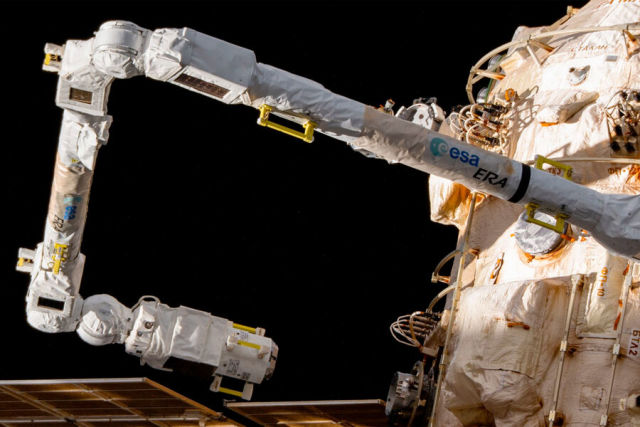Rogozin instructed the astronauts on the ISS to stop working with the European ERA manipulator
Russian cosmonauts will not use the European ERA manipulator installed on the Nauka module on the ISS, Roscosmos CEO Dmitry Rogozin said. He made this decision in response to the refusal of the European Space Agency to cooperate with Russia on the ExoMars program. Roscosmos has been involved in the project since 2012, but now plans to launch a research mission to Mars on its own.
The Russian crew on the International Space Station will no longer work with the ERA manipulator.
"I am giving the command to our crew on the ISS to stop working with the European ERA manipulator. Let [ESA Director General Joseph] Aschbacher himself and his boss [head of European diplomacy Josep] Borrel fly into space and do at least something useful in their lives," Roscosmos CEO Dmitry Rogozin said.
The European Robotic Arm (ERA) remote-controlled space robot manipulator, created by ESA for assembly work and maintenance of the Russian segment of the ISS, was installed on the Nauka module in May 2021. He was able to transfer equipment and materials from the sealed part of the station to its surface without the need for astronauts to go into outer space.
The decision of Roscosmos to stop working on ERA was a response to the refusal of the European Space Agency (ESA) to cooperate on the ExoMars mission.
Mars for two
Roscosmos, together with the European Space Agency, worked on the ExoMars automatic interplanetary station. With the help of it, scientists planned to find evidence of the existence of life on the planet.
On July 12, the ESA Board of Governors decided to terminate cooperation with Roscosmos in this area.
According to him, new ideas on further actions with other partners will be presented at a media briefing on July 20.
The agency has previously stated that it considers the launch of ExoMars unlikely due to the sanctions imposed on the Russian Federation due to military actions in Ukraine.
The press service of Roscosmos, in turn, stressed that Russia can implement its part of the ExoMars project at the national level or with the involvement of partners from "friendly countries".
"It is a pity that the search for signs of life on Mars for Europe turned out to be less important than the political ambitions of individual European officials and countries," the state corporation said.
Own mission
Back in March, Rogozin said that Russia would independently launch a research mission to Mars. According to the Director General of Roscosmos, the work will be deployed in the near future, and the shipment will take place on an Angara-A5 carrier rocket from the Vostochny cosmodrome.
"We are responsible to our science, we will have to repeat it," Rogozin said.
"The lander itself is a research station. It will be enough for the implementation of the mission. We will simply repeat what we have already done, but whether they [the Europeans] will do it without us is a big doubt," Rogozin said.
In his opinion, the European Space Agency will need at least six years to recreate the lander for ExoMars, which was created at Lavochkin's NGO.
The return of the "Cossack" from Italy
The Mars exploration station consists of a European flight module, a Russian landing module with a landing platform "Kazachok" and a European rover "Rosalind Franklin". Its launch was scheduled to take place from September 20 to October 1, 2022. The landing of the Cossack from Rosalind Franklin on Mars was expected by June 2023.
Now the "Cossack" is located on the territory of the Thales Alenia Space enterprise in Turin. Roscosmos previously reported that it could not return the landing module from Italy due to the lack of air traffic. Now the corporation will need a new landing platform for the Russian Mars exploration program.
"It is not difficult to repeat the Kazachok lander, which we made for the ExoMars mission. All the drawings are there, this is our work," the head of Roscosmos assured.
The main thing about the Mars exploration program
ExoMars is a joint ESA and Roscosmos Mars exploration program consisting of two projects - the ExoMars-TGO probe and the Rosalind Franklin rover. The main goal of the project was to search for evidence of the existence of life on Mars in the past and present. Roscosmos agreed to participate in this project in 2012.
The first spacecraft successfully arrived in Mars orbit in October 2016 and investigated the properties of the planet's atmosphere. The launch of the second half of the ExoMars mission was originally planned for 2018, but later the launch was postponed to 2020, and then to 2022.
Alice Andreeva


